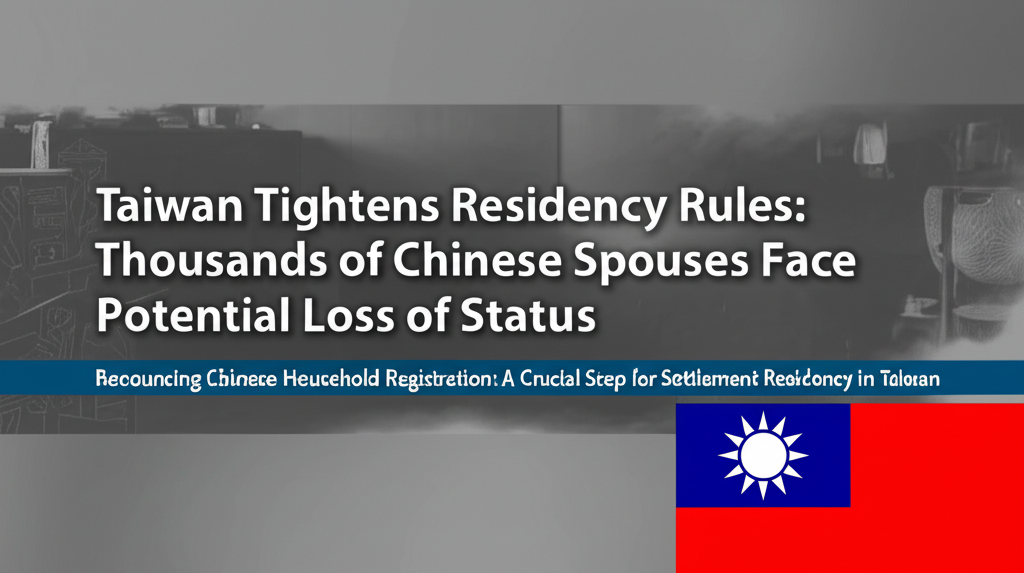Taiwan Tightens Residency Rules: Thousands of Chinese Spouses Face Potential Loss of Status
Renouncing Chinese Household Registration: A Crucial Step for Settlement Residency in Taiwan

Taipei, Taiwan – Approximately 10,000 Chinese spouses residing in Taiwan are at risk of losing their settlement residency status. This follows a review by the National Immigration Agency (NIA), which revealed that they have not submitted the required proof of renouncing their Chinese household registration.
NIA Deputy Director-General Chen Chieh-cheng (陳建成) stated that the majority of the 140,000 Chinese spouses granted settlement residency have already complied with the regulations. The NIA has notified the remaining individuals, with some citing health issues and the challenges of the COVID-19 pandemic as reasons for the delay.
Settlement residency is a critical step for Chinese spouses. It allows them to apply for household registration and, ultimately, Taiwanese citizenship. However, applicants must provide documentation confirming they have relinquished their Chinese household registration.
Article 9-1 of the Act Governing Relations between the People of the Taiwan Area and the Mainland Area (Cross-Strait Act) underscores this requirement. It stipulates that Taiwanese residents are prohibited from holding household registrations in the Mainland Area. Failure to comply can lead to the loss of Taiwanese status and rights.
Liang Wen-chieh (梁文傑), deputy head of the Mainland Affairs Council (MAC), explained that a comprehensive review is underway. The NIA previously addressed non-compliance on a case-by-case basis, triggered by individual reports.
As of the reporting day, the authorities have revoked the "status as people of the Taiwan Area" of 676 individuals. The NIA aims to assist the remaining 10,000 who have yet to submit the necessary proof. They will collaborate with the MAC and the Straits Exchange Foundation (SEF) to explore viable solutions for those facing difficulties.
The MAC and NIA have received inquiries from affected Chinese spouses. Some have provided reasonable explanations for the delay. Others have offered a variety of less convincing reasons.
According to a source, those who receive the notice have a three-month deadline to submit the required documentation. Failure to do so could result in the revocation of settlement residency and Taiwanese household registration, potentially leading to the loss of citizenship.
The NIA clarified that individuals who lose their settlement residency but still meet the original criteria for residing in Taiwan, such as marriage to a Taiwanese citizen, may reapply for long-term residency.
The NIA's actions have drawn criticism from opposition parties. The Taiwan People's Party (TPP) questioned the retroactive application of laws and criticized the government's approach. The Kuomintang (KMT) is also providing assistance to affected constituents.
Other Versions
Taiwán endurece las normas de residencia: Miles de cónyuges chinos pueden perder su estatuto
Taïwan durcit les règles de résidence : Des milliers de conjoints chinois risquent de perdre leur statut
Taiwan Memperketat Aturan Kependudukan: Ribuan Pasangan Tionghoa Menghadapi Potensi Kehilangan Status
Taiwan inasprisce le regole sulla residenza: Migliaia di coniugi cinesi rischiano di perdere il loro status
台湾、居住規則を強化:数千人の中国人配偶者が資格喪失の可能性
대만, 거주 규정 강화: 수천 명의 중국인 배우자가 잠재적 신분 상실 위기에 처해 있습니다.
Hinigpitan ng Taiwan ang mga Panuntunan sa Paninirahan: Libu-libong Asawang Tsino Ang Maaaring Mawalan ng Katayuan
Тайвань ужесточает правила проживания: Тысячам китайских супругов грозит потеря статуса
ไต้หวันเข้มงวดกฎการพำนัก: คู่สมรสชาวจีนหลายพันคนเผชิญความเสี่ยงสถานะอาจถูกเพิกถอน
Đài Loan siết chặt quy định cư trú: Hàng ngàn vợ/chồng người Trung Quốc đối mặt với nguy cơ mất tư cách cư trú

